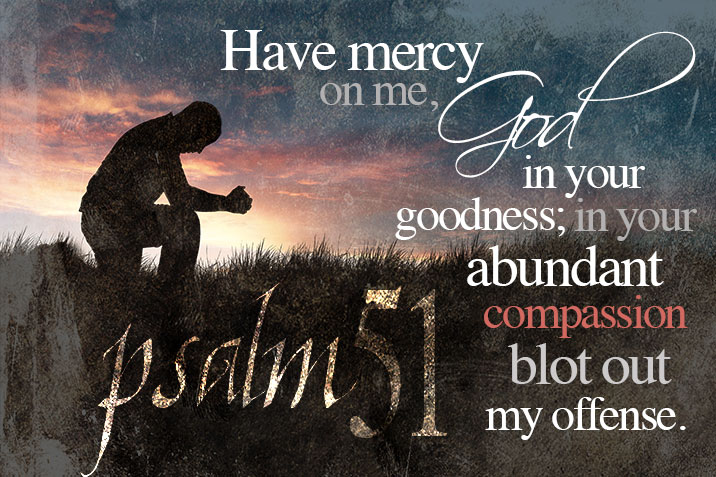
A Cry For Forgiveness
In this Psalm David prays for remission of sins which he confesses fully. This is the fourth and most profound of the Penitential Psalms. The depth of individual experience, the sense of sin, and the plea for forgiveness are unsurpassed in any other psalm.
it describes a worshiper who goes to the Temple for pardon and cleansing.
Whether David composed the poem or not, his experience seems to have occasioned it.
The Psalm has four major points which serve as a model for us when we confess sin and pray for restoration of the fellowship that God wants us to have with Him.
A Cry for Mercy.
Have mercy on me, O God. David openly admits his sin. He accepts all responsibility. He doesn’t blame anybody else. He also admits that he doesn't deserve forgiveness so he pleads for mercy. That mercy is based on God’s loving-kindness. He asks that his sin be wiped out and washed away.
Micah 7:18-19 NIV Who is a God like you, who pardons sin and forgives the transgression of the remnant of his inheritance? You do not stay angry forever but delight to show mercy. You will again have compassion on us; you will tread our sins underfoot and hurl all our iniquities into the depths of the sea.
Isaiah 43:25 NIV “I, even I, am he who blots out your transgressions, for my own sake, and remembers your sins no more.
A Confession of Sin.
For I know my transgressions. David emphasizes the fact that he knows and is constantly aware of his sin, and acknowledges that his sin is more than sin against man. In fact he says that he knows that is sin is against God. The depth of his confession is apparent in his desire to be completely open with God regarding in despondency because of his sin.
A Plea for Cleansing.
Cleanse me... wash me. The verbs are extremely significant. David starts by asking for i external cleansing. Cleansing with hyssop and washing are related to ritual acts. He then shifts to an internal cleansing. He asks for a new heart and renewed spirit.
Ezekiel 36:26 NIV I will give you a new heart and put a new spirit in you; I will remove from you your heart of stone and give you a heart of flesh.
A Vow of Consecration.
Then will I teach. David vows to to testify to others as evidence of God’s forgiveness and his changed nature. He acknowledges that his sin requires more than the ritualistic burnt offerings.
Psalm 50:9-11 NIV I have no need of a bull from your stall or of goats from your pens, for every animal of the forest is mine, and the cattle on a thousand hills. I know every bird in the mountains, and the insects in the fields are mine.
Instead of ritual David offers his broken spirit and contrite heart.
A Prayer for Restoration.
Then you will delight. David says that after offering his broken and contrite heart then God will accept his ritualistic sacrifices. This appears to place an emphasis on works being a requirement of sacrifice. We know that after Jesus’ sacrifice works is no longer a requirement, but a result of forgiveness.
Titus 3:4-7 NIV But when the kindness and love of God our Savior appeared, he saved us, not because of righteous things we had done, but because of his mercy. He saved us through the washing of rebirth and renewal by the Holy Spirit, whom he poured out on us generously through Jesus Christ our Savior, so that, having been justified by his grace, we might become heirs having the hope of eternal life.
Ephesians 2:8-9 NIV For it is by grace you have been saved, through faith—and this is not from yourselves, it is the gift of God— not by works, so that no one can boast.

 RSS Feed
RSS Feed